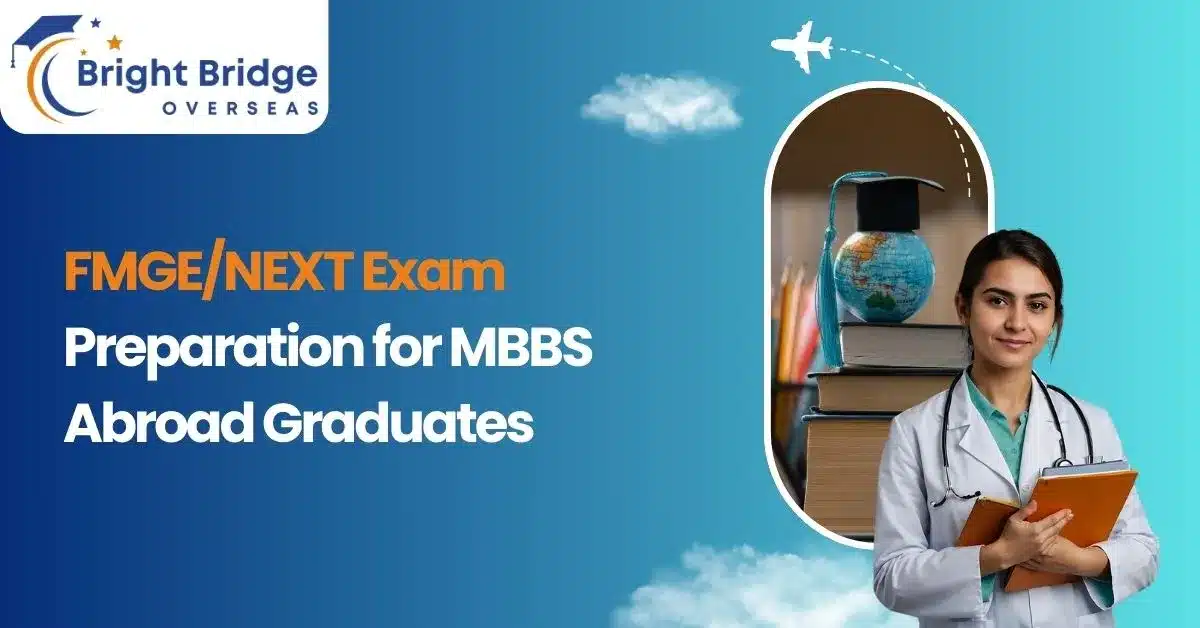When considering medical education abroad, a common question among aspiring students is: Is NEET required…

Choosing the right university for your MBBS studies abroad is one of the most crucial decisions for your medical career. With a variety of options available worldwide, it’s essential to consider several factors before making a decision. This guide will help you navigate the process and select the best medical university abroad.
Table of Contents
Accreditation and Recognition
Accreditation is a vital factor when selecting a university for your MBBS studies abroad. Accreditation ensures that the medical program meets established academic standards and that your degree will be recognized internationally.
Why Accreditation Matters?
- Accreditation ensures that the university adheres to high educational and ethical standards.
- It provides credibility to your degree, ensuring its acceptance for further studies, licensing exams, or medical practice worldwide.
- Medical councils and licensing authorities often require a degree from an accredited institution.
Key Accrediting Bodies to Check
- National Medical Commission (NMC): For Indian students, it is essential to confirm if the university is recognized by the NMC to be eligible to practice in India.
- World Health Organization (WHO): WHO maintains a database of medical schools that meet international standards.
- Foundation for Advancement of International Medical Education and Research (FAIMER): Check if the university is listed in the FAIMER International Medical Education Directory (IMED).
- World Directory of Medical Schools (WDMS): This directory provides a comprehensive list of globally recognized medical institutions.
How to Verify Accreditation?
- Visit the official websites of the accrediting bodies (NMC, WHO, FAIMER, WDMS) to verify the university’s status.
- Contact the university directly to request proof of accreditation and affiliation.
- Consult with educational consultants or alumni who have studied in the university.
Course Curriculum and Language
Selecting a university that offers a well-structured curriculum, and an English-medium education is essential for international students.
Why Language Matters?
- Many universities abroad offer medical programs in English, removing the language barrier for students.
- Learning in English enhances the understanding of medical terminologies and concepts.
- Some universities may require students to pass a basic English proficiency test.
Evaluating the Curriculum
- Ensure the curriculum aligns with international medical standards and covers both theoretical knowledge and practical training.
- Check for integrated courses that combine classroom learning with clinical exposure.
- Look for programs offering simulation labs and advanced medical facilities for hands-on learning.
Confirm if the curriculum is NMC-approved (for Indian students) to ensure eligibility for the FMGE or NEXT exams.
Dreaming of studying abroad? Let us help you find the best university for your MBBS journey. Contact us now for expert guidance!
Tuition Fees and Financial Planning
Understanding the financial aspects of studying abroad is crucial for effective planning.
Tuition Fees
- Tuition fees for MBBS programs can vary significantly depending on the university and country.
- Universities in Eastern Europe and Asian countries often offer affordable medical education compared to Western countries.
- Make sure to check for hidden costs like lab fees, exam fees, and material charges.
Living Expenses
- Consider expenses like accommodation, food, transportation, and personal needs.
- Some countries offer student discounts on public transport and other services.
Scholarships and Financial Aid
- Many universities offer merit-based scholarships and need-based financial aid for international students.
- Research government scholarships or private funding options.
- Some financial institutions offer education loans with flexible repayment options.
Budget Planning Tips
- Create a comprehensive budget covering tuition fees, accommodation, meals, travel, and medical insurance.
- Plan for emergency funds to cover unexpected expenses.
- Explore opportunities for part-time jobs if allowed by the host country.
Clinical Exposure and Practical Training
- Select universities with strong partnerships with hospitals for clinical rotations.
- Ensure the institution provides sufficient hands-on training to enhance practical knowledge.
- Verify the hospital’s reputation and facilities for medical training.
- Confirm the number of hours dedicated to clinical practice to ensure comprehensive exposure.
University Infrastructure
- Choose universities with modern laboratories, libraries, and simulation centres.
- Evaluate the availability of medical equipment and technology for a quality learning experience.
- Check for access to research facilities and collaboration opportunities.
- Ensure there are digital resources and online learning support.
Want to become a doctor? Start your MBBS abroad journey with expert guidance. Contact us today!
Student Support Services
- Choose universities that offer academic counselling, career guidance, and mental health support.
- Confirm the presence of student communities and international student support networks.
- Ensure there are dedicated staff to assist with visa applications, residence permits, and legal formalities.
- Look for universities that provide orientation programs and cultural integration activities.
Location and Safety
- Evaluate the safety, political stability, and overall security of the country.
- Research the local laws, customs, and emergency support services.
- Consider the climate and cultural environment for a comfortable student experience.
- Ensure the availability of health facilities and medical support.
Post-Graduation Opportunities
- Confirm whether the degree is recognized in your home country and internationally.
- Evaluate the university’s career support services and job placement assistance.
- Research the eligibility to appear for global licensing exams like USMLE, PLAB, or FMGE.
- Explore opportunities for postgraduate studies or internships in reputed medical institutions.
Alumni Network and Reviews
- Connect with university alumni to gather insights about academic quality and campus life.
- Join online forums, university groups, and social media channels to read testimonials.
- Evaluate the university’s alumni success rate and career progressions.
- Consider feedback from current students to get an updated perspective.
Frequently Asked Questions
Which university is best for MBBS abroad?
The best university for MBBS abroad depends on factors like accreditation, tuition fees, curriculum, and clinical exposure. Popular choices include universities in Georgia, Russia, and Ukraine.
How many marks are required in NEET for MBBS abroad?
Indian students typically need a minimum of 137 marks (for general category) and 107 marks (for reserved categories) in NEET to qualify for MBBS admission abroad, although the cut-off may vary yearly.
Which agency is best for MBBS abroad?
Consultancies like Bright Bridge Overseas offer reliable guidance for MBBS admissions abroad, assisting with university selection, documentation, and visa processes.
Is MBBS under 10 lakhs abroad?
Yes, some universities in countries like Kyrgyzstan, Kazakhstan, and Russia offer MBBS programs with tuition fees under 10 lakhs INR, providing an affordable option for Indian students.
Conclusion
Choosing the best university for MBBS abroad requires thorough research and careful planning. By considering factors like accreditation, curriculum quality, financial aspects, and career prospects, you can ensure a well-informed decision that shapes a successful medical career. Take your time, compare your options, and embark on your journey to becoming a doctor with confidence.


